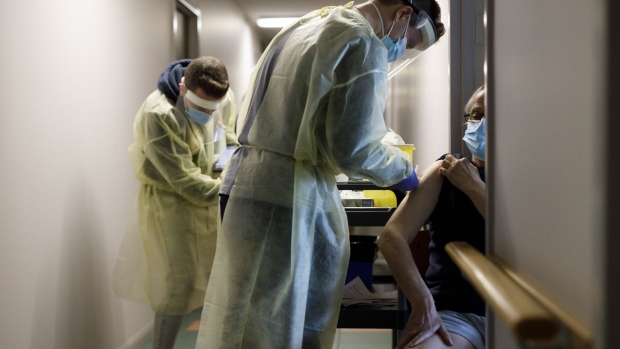Apr 17, 2021
Police Balk at New Edict as Ontario Brings In Emergency Measures
, Bloomberg News

(Bloomberg) -- Ontario Premier Doug Ford said he had no choice but to impose some of North America’s toughest restrictions to curb a sharp rise in Covid-19 cases. Some police forces are pushing back.
Canada’s largest province laid out new measures Friday as part of an emergency stay-at-home order, prompted by a jump in serious virus cases. Ford’s government gave police extraordinary powers to stop vehicles and individuals, to ask why they aren’t at home.
But police in Toronto, Waterloo and other cities quickly issued statements saying they won’t do random checks.
In the nation’s capital, the Ottawa Police Service said late Friday it won’t conduct random stops and doesn’t want its powers to impact public trust. But it will be involved with setting up checkpoints on bridges between Ontario and neighboring Quebec, after Ford’s government announced new constraints on travelers from other provinces. People will still be allowed to cross the provincial boundary for work.
The Ontario premier banned almost all outdoor public gatherings, closed golf courses and children’s playgrounds, and shut down some construction sites. That comes on top of earlier moves to close schools and non-essential retailers. In some parts of the province, including Toronto, hair salons and restaurant dining rooms have been closed for several months.
“My friends, we’re losing the battle between the variants and vaccines,” Ford said at a news conference Friday after reporting 4,812 new cases in 24 hours, a record. “The reality is, there are few options left.” The province currently has 2,065 patients hospitalized with the virus, 726 of whom are in intensive care units.
Ford’s new measures have divided opinion in the province of 14.7 million people. Some say his government should have cracked down sooner and acted to reduce activity in warehouses, factories and other work sites, which have seen dozens of virus outbreaks. Others argue the restrictions go too far, curbing civil liberties in the face of evidence that most outdoor activity is safe.
Canada has experienced a shortage of vaccines, hampering the country’s efforts to contain a third wave of the virus. About 22% of Canadians have received at least one dose of a Covid-19 vaccine versus 39% in the U.S. and 49% in the U.K., according to the Bloomberg Vaccine Tracker.
This week, Canada passed the U.S. for the first time in the number of new Covid-19 cases per capita. In Ontario, with the exception of emergencies, surgeries are to be canceled across most of the province as intensive care units concentrate on treating Covid-19 patients.
©2021 Bloomberg L.P.